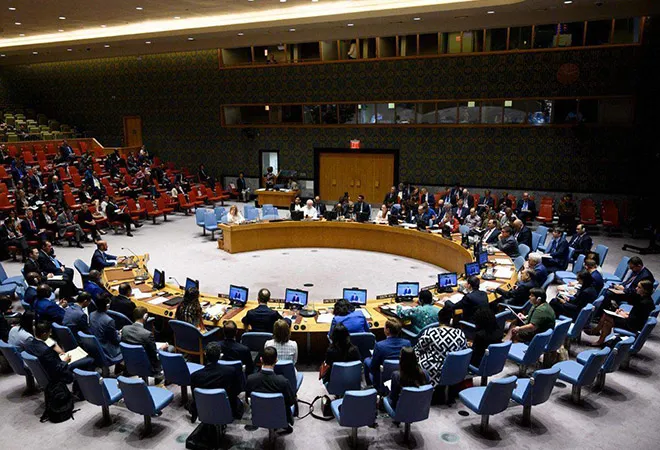
On 11 July, a
draft resolution collapsed in the United Nations Security Council (UNSC) after Russia used its veto and China abstained from voting. The resolution was to reauthorise the cross-border mechanism for the delivery of humanitarian aid into Syria. The cross-border mechanism helped 2.7 million Syrians every month by supplying United Nations (UN)-monitored aid to Syria’s rebel-held areas. Barring Russia and China, 13 among the 15-member Security Council had supported the resolution. Without the Security Council’s authorisation, the
UN cannot continue to deliver aid and the Syrian government gains control of humanitarian aid distribution within Syria. China
justified its abstention from this resolution by expressing that the principles of state sovereignty and non-interference must be followed in delivering aid to Syria.
Without the Security Council’s authorisation, the UN cannot continue to deliver aid and the Syrian government gains control of humanitarian aid distribution within Syria.
While stressing on the principles of state sovereignty and non-interference, China follows a pattern of glossing over other internationally agreed principles like human rights and the right to humanitarian aid. This was the case in 2019 when a tandem veto by Russia and China blocked the Security Council resolution for new elections and unhindered distribution of humanitarian aid in Venezuela. The Chinese offered a similar
justification based on respecting state sovereignty and the principle of non-interference when it used its veto power in 2022 to protect
North Korea from sanctions. This indicates a growing pattern in China’s veto usage at the UNSC. China justifies its veto by providing its own perception of the principles of sovereignty and non-interference.
In presenting state sovereignty and non-interference as principles that supersede other principles like human rights, China’s veto usage can be seen as an act of using its permanent seat at the UNSC to
redefine multilateralism. China’s understanding of multilateral cooperation is highly statist in nature as it perceives international organisations as mere tools at the disposal of states. This benefits China’s global calculus in isolating internal disturbances in
Xinjiang, Tibet, and Hong Kong from external influence by internationally building upon its own perception of the principles of sovereignty and non-interference. This calculus of redefining multilateralism becomes even more evident when it is considered that China does not have any direct interest in Syria, unlike Russia. Yet, China has established a strong voting partnership with Russia on the Syrian issue in the Security Council.
In presenting state sovereignty and non-interference as principles that supersede other principles like human rights, China’s veto usage can be seen as an act of using its permanent seat at the UNSC to redefine multilateralism.
Looking at the data from last 10 years, China has formally used its veto in nine instances (See Table 1). All nine instances were a case of a tandem veto where China partnered with Russia in vetoing the resolutions under consideration. Seven of these nine resolutions were concerning Syria, where China apparently has no direct interests. The remaining two were on Venezuela and North Korea. Another common pattern observed throughout these vetoes remains China’s continued attachment to
Russia as a veto partner. Even if there have been cases where Russia has blocked a resolution while China has not, the Chinese usually make up for this by abstaining from the vote. The recent abstention by China on the issue of Syrian humanitarian aid follows this pattern.
Table 1: Cases of China using its veto power in the last ten years.
| No. |
Date |
Resolution |
Veto |
Agenda Item |
| 1 |
22.05.2014 |
S/2014/348 |
China
Russian Federation |
Middle East (Syria) |
| 2 |
05.12.2016 |
S/2016/1026 |
China
Russian Federation |
Middle East (Syria) |
| 3 |
28.02.2017 |
S/2017/172 |
China
Russian Federation |
Middle East (Syria) |
| 4 |
28.02.2019 |
S/2019/186 |
China
Russian Federation |
The situation in the Bolivarian Republic of Venezuela
|
| 5 |
19.09.2019 |
S/2019/756 |
China
Russian Federation |
Middle East (Syria) |
| 6 |
20.12.2019 |
S/2019/961 |
China
Russian Federation |
Middle East (Syria) |
| 7 |
07.07.2020 |
S/2020/654 |
China
Russian Federation |
Middle East (Syria) |
| 8 |
10.07.2020 |
S/2020/667 |
China
Russian Federation |
Middle East (Syria) |
| 9 |
26.05.2022 |
S/2022/431 |
China
Russian Federation |
Non-proliferation: North Korea |
Source: Security Council Veto List
A Common Partnership Against the West
In the cases listed above, the common outcome remained that the other three Western permanent members, i.e., the United States (US), United Kingdom (UK), and France were left powerless in the Security Council. Russia and China established a successful strategy to become a functional diplomatic counterbalance against the diplomatic heft of the three Western powers in the UNSC. It has transformed the Security Council into a cockpit of global politics where the Western version of multilateralism is now openly contested by the Chinese version of statist multilateralism, which is supported by Russia. The close coordination seen between Russia and China has made it highly unlikely for the West to authorise sanctions or military intervention towards any nation without the approval of these non-Western permanent members. The diplomatic memory of military action authorised by the UNSC in Libya has also contributed towards the hardening of the Russia-China stance on state sovereignty and non-intervention, further challenging the West.
Russia and China established a successful strategy to become a functional diplomatic counterbalance against the diplomatic heft of the three Western powers in the UNSC.
The Western permanent members in 2011 had pushed for
military action in Libya for civilian protection and had subsequently got the authorisation of the Security Council. Russia and China had reservations but instead of vetoing they abstained from voting. The subsequent use of the military authorised by the UNSC to change the Libyan regime deeply dented the credibility of the humanitarian cause before Russia and China. Apparently, it is one of the major reasons for the steep rise in the use of vetoes instead of abstentions from 2011 onwards by Russia and China (
See Graph 1). The hardening of the Chinese stance on state sovereignty and non-intervention by giving secondary importance to humanitarian issues is partly traceable to the handling of Libya by the Security Council.
Graph 1: Number of vetoes used by each member of the P-5 in every decade since 1951.
 Source: China’s Voting Practice at the UN Security Council
Source: China’s Voting Practice at the UN Security Council
A polarised Security Council
With the ongoing geopolitical strife in Ukraine and a headstrong China, what remains certain is the continuance of a mutual distrust from the Western side towards China and Russia as well. This makes consensus building within the Security Council a highly polarised issue. With the declining global power image of the US, Russia and China are seen as being more inclined to veto resolutions in the Security Council. Since 2011, Russia has exercised its veto more than any other permanent member in the Council while China comes in second (
See Graph 1). This is in stark contrast to the decadal trends seen from 1971 till 2010, where the US remained the most aggressive member in using the veto. Such a shift in the trend from 2011 onwards suggests that the Security Council is becoming a platform for openly contesting the polarised worldviews held by the US on the one hand and Russia-China on the other. This is bound to reduce the functional efficacy of the Council to arrive at crucial decisions where the international community is required to act responsibly. The counterbalancing against the West by Russia-China’s voting congruence on issues like humanitarian aid to Syria or the North Korean missile launches sets a vexing precedent for cooperative multilateralism.
With the declining global power image of the US, Russia and China are seen as being more inclined to veto resolutions in the Security Council.
Despite the voting alignment between Russia and China being a recent trend, the Security Council has not remained ignorant of the dangers of being deadlocked by a veto in crucial times. In a resolution passed on 3 November 1950, over two-thirds of UN Member states declared that in cases where international peace and security are at risk and the UNSC is paralyzed due to a veto, the General Assembly (UNGA) shall take up the matter and give recommendations. The issue with this mode of operation is that the UNGA can only recommend non-binding action. To solve such a situation, India proposed a reformed UNSC where the General Assembly holds a right to recall a permanent member in cases of it abusing its veto privilege. While such a structural adjustment to the Security Council’s frame seems far-fetched at the moment, an accountable Security Council offers the most reliable solution to adjust the contesting views on multilateralism held by China and Russia to those held by the West.
Angad Singh Brar is a researcher whose work focuses on issues of global governance, multilateralism, India’s engagement with international organisations and institutional reform.
The views expressed above belong to the author(s). ORF research and analyses now available on Telegram! Click here to access our curated content — blogs, longforms and interviews.



 On 11 July, a
On 11 July, a 
 PREV
PREV


